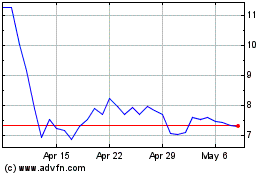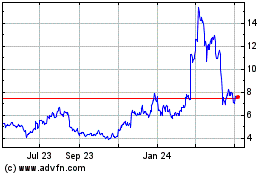Ethereum Demand Driven By Use In On-Chain Applications, Token Transfers: CoinShares
26 September 2024 - 3:30PM
NEWSBTC
Ethereum (ETH) demand is largely driven by the token’s use in
on-chain applications and token transfers, according to a report by
CoinShares. Ethereum’s Use-Cases Have Increased, But Long-Term
Value Is Missing In a recently published detailed report,
CoinShares’ Matthew Kimmell noted that despite Ethereum’s potential
to host popular applications in the future, investors are
struggling to see a significant value proposition in its native ETH
token. Related Reading: Ethereum ETFs See Largest Outflows Since
July: Is Waning Institutional Demand Hurting ETH? Since its
inception in July 2015, Ethereum has made big strides as it has
continually witnessed the emergence of new use-cases, starting from
simple token transfers, to use in on-chain applications,
decentralized finance (DeFi) protocols, and, most recently,
non-fungible tokens (NFTs). According to the report, Ethereum began
to see broader utility from 2018 onwards, when its major use
shifted from token transfers to simple on-chain applications,
digital identity systems, and on-chain withdrawals. From 2020
onwards, Ethereum has facilitated more complex use-cases such as
protocol staking, liquidity mining, MEV (maximum extractable
value), bridges, oracles, and second-layer technologies. Although
the increasing use-cases might sound favorable for Ethereum at the
surface level, the challenge lies in ETH usage being concentrated
among a limited range of services. The report reads: However, the
hard truth is that a very small set of services consistently makes
up the majority of Ethereum usage, and these sets largely revolve
around speculation or simple value transfer, not necessarily the
type of complex “real-world utility” use cases originally
envisioned by the developers of the Ethereum Foundation. The chart
below confirms this observation, showing that simple token
transfers and application interactions comprise the bulk of ETH
usage, followed by infrastructure, intermediary operations, and
contract management. Marketplaces Dominate Application Usage,
Stablecoins Lead Token Transfers The report highlights that
on-chain marketplaces – especially decentralized exchanges (DEXes)
like Uniswap – dominate application interactions. Notably, over 90%
of transaction fees originate from marketplace activity. In the
first half of 2024, Uniswap alone captured about 15% of Ethereum
transaction fees. This is not surprising, as the leading DEX
recently achieved the milestone of generating $50 million in
revenue. On the contrary, NFT trading platforms have suffered a
dramatic decline in user transactions since their peak in
2021. Token transfers continue to play a key role in the
Ethereum network activity. With the constantly expanding ecosystem,
the type of tokens being transferred has diversified. However, ETH,
and stablecoins such as USDT and USDC have emerged as the dominant
tokens in terms of transaction fees. The chart below illustrates
the rise of stablecoins from mid-2017, when USDT began to see high
adoption as a trading pair for almost all listed ERC-20 tokens on
crypto exchanges. Circle’s entry into the market in late 2020 with
its USDC stablecoin further boosted stablecoin usage within the
wider Ethereum ecosystem. An interesting observation made in the
report is regarding the increased use of Ethereum layer-2
solutions. While their adoption has tackled some of Ethereum’s
scalability issues, they have also, unintentionally reduced demand
for Ethereum’s base layer. Kimmel notes: In our view, the
latest major change, EIP-4844, which strongly incentivized Layer
2s, has worked directly against the economic design benefits of
EIP-1559, which tied the value of ether to its Layer 1 platform
demand. Related Reading: Ethereum Poised For A Comeback Following
Interest Rate Cut: Steno Research ETH trades at $2,613 at press
time, up 0.2% in the last 24-hour period. Stablecoins such as USDT
and USDC command a market cap of $119 billion and $36 billion,
respectively. Featured image from Unsplash, Charts from
CoinShares.com and Tradingview.com
Uniswap (COIN:UNIUSD)
Historical Stock Chart
From Dec 2024 to Jan 2025

Uniswap (COIN:UNIUSD)
Historical Stock Chart
From Jan 2024 to Jan 2025
